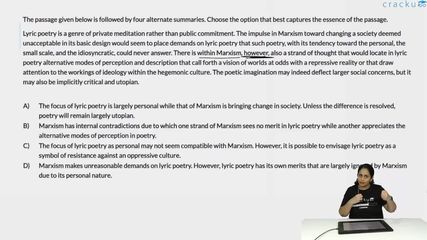Sign in
Please select an account to continue using cracku.in
↓ →
The passage given below is followed by four alternate summaries. Choose the option that best captures the essence of the passage.
Lyric poetry is a genre of private meditation rather than public commitment. The impulse in Marxism toward changing a society deemed unacceptable in its basic design would seem to place demands on lyric poetry that such poetry, with its tendency toward the personal, the small scale, and the idiosyncratic, could never answer. There is within Marxism, however, also a strand of thought that would locate in lyric poetry alternative modes of perception and description that call forth a vision of worlds at odds with a repressive reality or that draw attention to the workings of ideology within the hegemonic culture. The poetic imagination may indeed deflect larger social concerns, but it may also be implicitly critical and utopian.
The passage contrasts the personal, introspective nature of lyric poetry with Marxism's outward focus on societal change. At first glance, the characteristics of lyric poetry - being personal, small-scale, and idiosyncratic - seem incompatible with Marxism's demand for a transformative critique of an unjust society. However, the passage introduces a nuanced perspective within Marxist thought, which recognises lyric poetry as having an implicit critical and utopian function. Through its imaginative and alternative modes of perception, lyric poetry can challenge dominant ideologies and suggest a vision of resistance to oppression. Thus, while lyric poetry does not directly engage with large-scale social concerns, it can still align with Marxist ideals by offering subtle forms of critique and hope for change. Option C most effectively captures this idea.
None of the other choices present a valid interpretation of the passage. For instance, Option A oversimplifies the issue by portraying lyric poetry as merely ‘utopian,” ignoring its critical and resistant potential as described in the passage. It misses the nuanced compatibility suggested between lyric poetry and Marxism. Option B inaccurately suggests that Marxism has “internal contradictions,” which is not the focus of the passage. Similarly, Option D frames Marxism as dismissive of lyric poetry, ignoring the strand of Marxist thought that finds value in poetry's alternative perspectives; this misrepresentation makes it a weaker summary.

Click on the Email ☝️ to Watch the Video Solution
Create a FREE account and get:
Educational materials for CAT preparation